The situation in the border areas of Pakistan and neighbouring Afghanistan has been unstable since the Taliban came into power in Afghanistan, leading to a sharp increase in the number of attacks in border areas. The Pakistani government has strengthened militia forces to protect the area, but efforts to ensure security are facing many challenges, especially with the increase in attacks by Islamic jihadists in the past year since the ceasefire between the government and the Tehreek-e-Taliban Pakistan (TTP) broke down.
According to the Islamabad-based Centre for Research and Security Studies, the number of people killed in militant attacks and counter-terrorism operations in Pakistan climbed to more than 1,500 in 2023, the highest figure in the past six years.
The attack on the police force in Khyber Pakhtunkhwa Province occurred in the Mamund area of Bajaur District, bordering Afghanistan. A truck carrying about 25 police officers supporting the polio vaccination programme was rigged with an explosive device.
Khyber Pakhtunkhwa Province was once a stronghold of the TTP, a branch of the Pakistani Taliban. The TTP was listed by the US as a foreign terrorist organisation. Previously, some radical Muslim rebel groups carried out attacks that killed many medical workers who were participating in polio vaccination campaigns and security forces escorting these groups.
In the context that Pakistan is preparing to enter a general election next February, the sudden increase in attacks on security forces and civilians, especially in the two provinces of Khyber Pakhtunkhwa and Balochistan, has prompted Pakistani intelligence agencies to warn of the threat of militant attacks against election rallies in both localities.
On January 5, the Senate of Pakistan passed a resolution seeking to delay this important event due to "security concerns". This non-binding resolution was introduced by independent Senator Dilawar Khan. He requested a postponement of the election schedule to enable people across Pakistan, of all political stripes, to participate in the general election in an effective and safe manner.
Many Pakistani officials have expressed concern that the country's political leaders are facing terrorist threats during the run-up to the general election. There have previously been terrorist attacks on election days in Pakistan, and many political leaders, including former Prime Ministers Shaukat Aziz, Benazir Bhutto, Nawab Sanaullah Zehri and Mir Siraj Khan Raisani, have been targets of attacks during election campaigns and political rallies since 2002.
The security threat undermines stabilisation efforts to revive Pakistan's struggling economy. The South Asian country has fallen into a crisis of balance of payments as it must pay interest on foreign debt, while months of political upheaval have caused concern for foreign investors. Inflation has skyrocketed, with the value of the rupee falling to a record low against the US dollar, and industrial output has plummeted. According to the World Bank (WB), the poverty rate in Pakistan has increased from 34.2% to 39.4% over the past year, as an additional 12.5 million people fell below the poverty line with an income of just 3.65 USD per day. As a result, Pakistan currently has about 95 million people living in poverty. The Pakistani government has launched anti-terrorism campaigns and coordinated with neighbouring countries to strengthen border control. However, the security situation in the border area with Afghanistan and the existence of several terrorist groups not only influences Pakistan but also poses a security threat to the region, which is always inherently unstable.
















